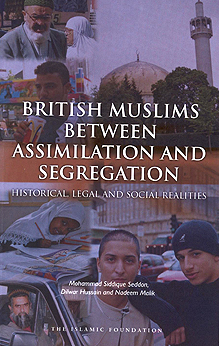
Author: Mohammed Sidiq Seddon, Dilwar Hussain, Nadeem Malik,
Genre: History
Publisher: Islamic Foundation
Release Date: 1 January 2004
Format: Paperback
Pages: 240
Source: Website is not available
This is a companion volume to the Islamic Foundation’s ‘British Muslims Loyalty and Belonging’, drawing on the discussion and issues raised at a seminar held in June 2002 in collaboration with the Citizen Organising Foundation. Though many of the essays tackle the same concepts and issues, this does not detract from its richness. The work should be read by serious-minded young Muslims who presently find themselves in the eye of the storm. They are the subject of academic and political interest, but it is within their grasp not to be passive actors taking up expected roles, but rather activists charting out their own destinies.
Chapter 1, ‘Muslim Communities in Britain: A Historiography’ is an excellent essay by Mohammed Siddique Seddon. It concludes that “young Muslims feel able to interpret and express their sense of ‘Muslimness’ within the cultural context of their new identities and environments. This shift from their geographical, ethnic and cultural origins results in their sense of Muslim identity within the global community of Islam – the ummah – becoming heightened”. Whether this evolves to a relationship of the type many British Roman Catholics feel towards Rome – a spiritual and moral allegiance rather than political – is a topic worth exploring by Seddon in further research. The essay includes a critique of Phillip Lewis’s ‘Islamic Britain’ for presenting one particular community in Bradford as the British Muslim paradigm.
Chapter 2, ‘Equality? The treatment of Muslims under the English Legal System’ aims to explore the rights of British Muslims within the English Legal System. The essay offers a reference point for non-specialist readers but this is a rapidly evolving area and in itself is not self-standing.
Chapter 3, ‘British Muslim identity’ by Dilwar Hussain offers “an insider view of British Muslim identity, primarily addressing a second generation, British Muslim audience”. The book takes its title from a line of argument in this chapter, “Integration is a very problematic word to use as people have varying definitions. Here is used as opposed to assimilation or segregation, as a middle way in which minority communities can become part of society while maintaining something of their values and religious and cultural norms”. A valuable section in the chapter shows how an application of the teachings and precepts drawn from the Qur’an, sunnah and other Islamic sources, including the rulings of contemporary Muslim scholars, should shape the attitudes and behaviour of Muslims in Britain.
Subsequent chapters are less engaging. These include ‘Locating the Perpetuation of ‘Otherness’: Negating British Islam’ by Mohammad Siddique Seddon, ‘Friends, Romans, Countrymen?’ by Nadeem Malik and ‘Councillors and Caliphs: Muslim Political Participation in Britain’ by Dilwar Hussain. Nevertheless the book is an otherwise admirable attempt by a group of young British Muslim scholars who have benefited from the intellectual space and other facilities offered to them by the Islamic Foundation, Leicester.
